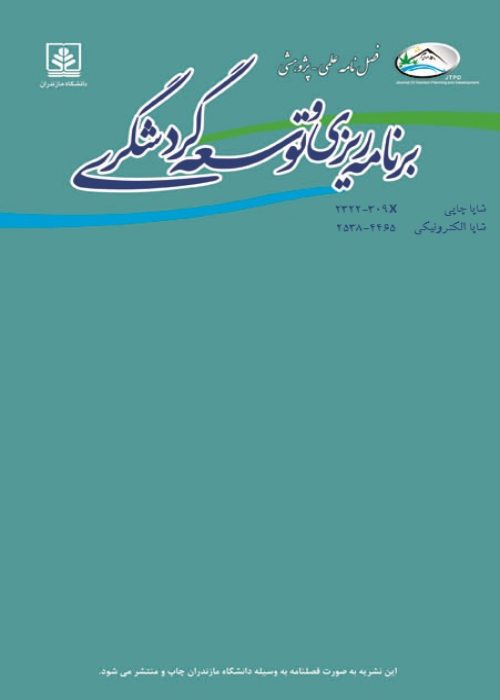Analysis of the Role of Tourism on Economic Welfare Using Panel Data
Author(s):
Article Type:
Research/Original Article (دارای رتبه معتبر)
Abstract:
Introduction
Increasing the welfare and reducing the poverty is one of the main objectives of economic development plans in any country and providing the desirable living conditions for all people is one of the most important tasks of the economic policy makers. On the other hand, tourism industry is known as one of the most influential industries of the world nowadays which causes the flow of capital and money in local, regional, national and international scales more than any other activities in the world. So, most of the countries consider the tourism, which has beautiful and diverse nature, customs, culture and historical background as its raw materials, as the best way to achieve their goals.The effect of tourism on employment, increase in foreign exchange earnings, prosperity of domestic industries, expansion of international cooperation and above all, on improvement of the living standards of people has changed the attitudes towards it. Accordingly, this industry can be considered as an effective one on economic welfare.
Considering the impacts of tourism in different economic aspects, the present study seeks to answer the following questions: Basically in what way and to what extent does tourism value added affect the economic welfare in a selection of countries which include different groups? The other purpose of this study is that if there is a significant difference in the type and amount of effectiveness of tourism sector in economic welfare in different groups of countries. In other words, does classification of countries based on features such as fuel exporting, being among the top countries in terms of tourism and being among the developed countries that are members of the OECD, make any difference in the type of relationship between tourism and economic welfare? Material and Method: Based on the conducted studies, the research model of the present study is as a following equation: (1)
Where IEWB is dependent variable and indicate the index of economic welfare. Tourist indicates the real value added of tourism sector. Considering the theoretical principles, the effect of this variable on economic welfare is obscure.
GDP indicates the real gross domestic product. In this research, we used GDP per capita at constant 2010 prices. It is expected that the sign of this variable to be positive and statistically significant.
Inf Indicates the inflation rate. In economic literature and based on the other studies, inflation has a negative effect on economic welfare in the short run, but in the long run this effect is not significant.
Index of i indicates the 50 countries. In order to answer the questions, basic research model has been redefined in three following scenarios:First Scenario: this scenario tries to answer whether there is a difference between fuel exporting countries and other countries in terms of the type and amount of effectiveness of tourism sector on economic welfare.
Second Scenario: this scenario tries to answer whether there is a difference between the top countries in tourism industry and other countries in terms of effectiveness of tourism sector on economic welfare.
Third Scenario: this scenario tries to answer whether there is a difference between members of OECD and other countries in terms of effectiveness of real value added of tourism sector on economic welfare.
It should be mentioned that the present study is a practical library research. The statistical population includes the countries for which the required information and data related to the index of economic welfare have existed. In this regard, the sample consist the countries that have the data related to other variables of the research model in addition to the information related to the index of economic welfare.
Conclusion
The present study investigates the effect of tourism sector on economic welfare in a selection of 50 countries in the form of a basic model and 3 scenarios in 2004 to 2016. For this purpose, we used panel data method. The results indicate that in accordance with theoretical expectations, the real value added of tourism sector and the gross domestic product has positive effects and inflation has negative effect on economic welfare. However, the type and amount of these effects are different in various groups of countries. Somehow that, because countries that are reliant on revenues from the sale of natural resources are usually less able to benefit from the potentials of tourism sector, in fuel exporting countries the positive effect of tourism on economic welfare is less than other countries. In this group, GDP increases economic welfare more than other countries. Also, the negative effect of inflation on economic welfare in fuel exporting countries is less than others.According to expectation, the positive effect of tourism on economic welfare in top countries in tourism industry is more than other countries. So that, one percent increase in real value added of tourism sector increases economic welfare in top countries in terms of tourism industry 0.155 percent more than other countries. This is because the existence of proper infrastructures in these countries makes greater utilization of tourism possible. Moreover, in this group, positive effect of GDP on economic welfare is higher than other countries, while there is no significant difference in the amount of negative effect of inflation on economic welfare.
There is no significant difference between members of OECD and other countries in the amount of effectiveness of tourism on economic welfare. In this regard, in both groups, this effect is positive and equal, so that in both groups tourism sector affects economic welfare with the same coefficient (0.91). This is while the amount of the effects of production and inflation on economic welfare in members of OECD is different than other countries, so that the difference in the amount of positive effect of GDP is 0.196 and the difference in the amount of negative effect of inflation is 0.0006.
The economy of Iran is classified in the group of fuel exporting countries, in which a lower effectiveness of tourism sector is observed. The reason stems from the fact that economies such as Iran, which are reliant on sale of natural resources, are usually less able to utilize the potentials of tourism sector. Moreover, due to the proceeds from the sale of national and intergenerational wealth, there is little interest in increasing the national income and consequently wealth accumulation through tourism in such economies. Accordingly, it is predictable that economies like Iran will face many problems in the future if they do not make appropriate and necessary efforts to create a proper environment for attracting tourists. Therefore, it is suggested that, by using the income from the sale of fossil resources such as oil and gas, the required infrastructures for tourism industry would be provided for the private sector. This policy can improve economic welfare via development of tourism sector.
According to most researchers in the field of tourism economics, to create a fundamental change in tourism sector and consequently a greater effect of tourism on economy it is recommended that: first, along with breaking the state monopoly in tourism and other instances such as stipulating a precise definition of tourism economics, demonstrate and explain the contribution, role and position of private sector in tourism. Second, resolve the deficiency of accommodation areas through a medium-term plan. Third, in order to expand foreign tourism, policy makers consider the status of air transportation and
Keywords:
Language:
Persian
Published:
Journal of Tourism Planning and Development, Volume:7 Issue: 26, 2018
Pages:
96 to 121
magiran.com/p1916951
دانلود و مطالعه متن این مقاله با یکی از روشهای زیر امکان پذیر است:
اشتراک شخصی
با عضویت و پرداخت آنلاین حق اشتراک یکساله به مبلغ 1,390,000ريال میتوانید 70 عنوان مطلب دانلود کنید!
اشتراک سازمانی
به کتابخانه دانشگاه یا محل کار خود پیشنهاد کنید تا اشتراک سازمانی این پایگاه را برای دسترسی نامحدود همه کاربران به متن مطالب تهیه نمایند!
توجه!
- حق عضویت دریافتی صرف حمایت از نشریات عضو و نگهداری، تکمیل و توسعه مگیران میشود.
- پرداخت حق اشتراک و دانلود مقالات اجازه بازنشر آن در سایر رسانههای چاپی و دیجیتال را به کاربر نمیدهد.
دسترسی سراسری کاربران دانشگاه پیام نور!
اعضای هیئت علمی و دانشجویان دانشگاه پیام نور در سراسر کشور، در صورت ثبت نام با ایمیل دانشگاهی، تا پایان فروردین ماه 1403 به مقالات سایت دسترسی خواهند داشت!
In order to view content subscription is required
Personal subscription
Subscribe magiran.com for 70 € euros via PayPal and download 70 articles during a year.
Organization subscription
Please contact us to subscribe your university or library for unlimited access!



